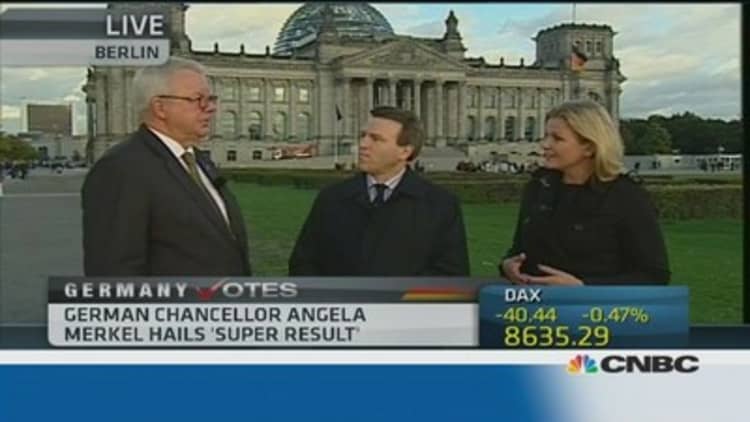Angela Merkel may have won a resounding victory in the German elections, but her triumph leaves some key questions unanswered — for Germany and for the euro zone.

The German Chancellor's re-election with an impressive 41.5 percent of the vote sounded the starting gun for complicated talks to form a coalition. Five seats short of an absolute majority, Merkel's conservatives will need to join forces with one of their rivals.
"Several weeks of contorted and confusing coalition negotiations lie in store in Germany after Chancellor Angela Merkel's victory in Sunday's elections. This could bring delays and raise fresh hurdles to measures to reinforce economic and monetary union," David Marsh, Chairman of the OMFIF think tank said.
(Read more: Germans give Merkel a mandate but markets muted)
Analysts expect Merkel to form a "grand coalition" in which her conservatives would rule alongside the social democrat SPD. The power-sharing arrangement would be a repeat of the one Merkel brokered in her first term between 2005 and 2009 and worked in Merkel's favor. For the SPD however it was not as successful.
"Her negotiations with the SPD will not be easy," analysts at Monument Securities said. They pointed out that the compromises SPD made to maintain the unity of the 2005-09 coalition undermined its popular support. In the 2009 elections, its share of the national vote slumped from 38 percent to 23 percent.
"The fear in party ranks will be that more compromises would weaken the SPD's electoral support even further."
As a result, the SPD could demand a concessions in return for its support — such as raising income tax for high earners — that would be unpalatable to Merkel's conservatives.
(Read more: What you didn't know about Angela Merkel)
Meanwhile, the political wrangling could place key eurozone reforms on the back burner, including the establishment of a banking union. To take the burden of rescuing shaky banks off the shoulders of debt-laden countries, European leaders have agreed to create a system that would move supervision of the financial sector to a European level. But Germany wants to keep responsibility for failing banks at the level of individual countries rather than create a common fund to cover the costs.
"The risk remains that proper provision for resolving distressed banks will still not be in place when the ECB is due to take over supervision of major European banks in October next year," Monument Securities said.
Talk of an alliance between Merkel and the center-left social democrats has also given rise to expectations that Merkel may soften her stance on austerity. The German chancellor has come to symbolize the push for austerity and financial discipline as the answer to Europe's economic problems, while other European leaders such as France's Francois Hollande pushed for policies that focused on growth.
"We see more growth support coming for struggling euro zone countries," analysts at Unicredit said. "The SPD repeatedly criticized Mrs Merkel for pushing too hard for structural reforms and spending cuts, thereby neglecting negative growth and employment dynamics in the euro zone."
(Read more: European markets)
Further assistance for Greece also seems likely. EU and International Monetary Fund inspectors are currently in Greece to review the progress the country has made under its bailout program. Merkel sought to sweep talk of further assistance to the country under the carpet during her election campaign, but the issue of the country's funds shortfall is certain to rear its head again.
But while Merkel's pragmatism may prompt her to soften her stance on austerity, OMFIF's Marsh cautioned against thinking that relaxing austerity in debt-ridden southern countries will now suddenly become the official Berlin line.
"In coming months, the present favorable German economic picture of low inflation, low unemployment, low interest rates and reasonable economic growth is likely to give way to a less propitious environment. The present conjuncture marks Merkel's golden age. From now on, it all gets much more difficult."
Follow us on Twitter: @CNBCWorld

